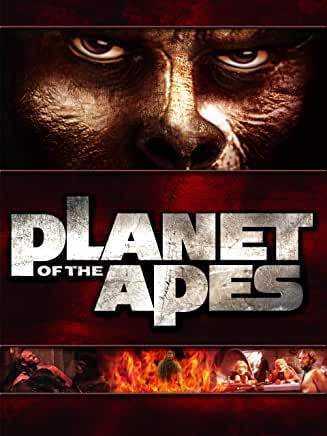"Planet of the Apes" (1968)—The Questions
+Guest Posts: Movie Wisdom By Guest Writer Eric Goebelbecker—Issue #14
Image by L.E. Wilson from RedBubble
The Movie:
Planet of the Apes (1968) is a drama directed by Franklin J. Shaffner, based on the book by Pierre Boulle, about a US astronaut, George Taylor (Charlton Heston), who crash-lands on a planet where humans are regarded as a lower species and non-human apes rule.
Life Lesson: “I would rather have questions that can’t be answered than answers that can’t be questioned.” — Richard Feynman
🍿Movie Scene Link (movie quote)
Guest Writer:
Eric Goebelbecker writes about science fiction in Are You Not Entertained?
Good science fiction engages with the real world. It uses imaginary universes, fantastical characters, and extraordinary circumstances to ask questions and sometimes offer answers about what we're going through in our reality. Planet of the Apes (1968) is an example of this type of story. It's layered with messages and meaning: a sci-fi everlasting gobstopper.
The obvious theme, at the outermost layer, is prejudice. Planet of the Apes is set in a topsy-turvy world where humans, rather than being masters of the world, are hunted, enslaved, experimented upon, and exhibited in zoos and labs. The basis for this prejudice is that they're "dumb animals," and apes that dare question that "fact" are persecuted for heresy. For a movie released in 1968, it's as subtle as brick hurled through a plate glass window.
Work your way through this treat of movie and you'll find layers about the Cold War, militarism, power, theocracy, and truth. It's no surprise when you see Rod Serling credited as a writer. Any one of Planet of the Apes subplots would work as a Twilight Zone episode.
But there's another layer in this movie: You can't go it alone.
Charlton Heston plays George Taylor, the commander of a four-person mission to an unnamed planet outside of the solar system. Taylor is a cynical, misanthropic loner that's prone to dramatic soliliquies, which is another way of saying he's portrayed by Charlton Heston. Heston plays the same character in two other sci-fi classics, Soylent Green (1973) and The Omega Man (1971). I'm pretty sure he played it in Ben-Hur, too, but I don't want to sit through that film again.
Here's Taylor's opening line in Planet of the Apes:
In less than an hour we'll finish our sixth month out of Cape Kennedy. Six months in deep space. By our time, that is. According to Dr. Hasslein's theory of time in a vehicle traveling nearly the speed of light, the Earth has aged nearly 700 years since we left it, while we've aged hardly at all. It may be so. This much is probably true.
The men who sent us on this journey are long since dead and gone. You who are reading me now are a different breed. I hope a better one. I leave the 20th century with no regrets, but...one more thing. If anybody's listening, that is. Nothing scientific. It's... purely personal. Seen from out here, everything seems different. Time bends. Space is... boundless. It squashes a man's ego.
I feel lonely. That's about it. Tell me, though... Does man, that marvel of the universe, that glorious paradox who has sent me to the stars, still make war against his brother, keep his neighbor's children starving?
Taylor has left his planet behind with "no regrets" and, in some foreshadowing that's another brick through another window, bemoans his species' warlike and selfish tendencies.
Taylor's attitude doesn't improve. He discovers that one of the crew members, his love interest, hasn't survived cryogenic sleep. The ship crash lands on an unknown planet. The astronauts encounter a gorilla hunting party, and he's shot in the throat as another crewmember is killed.
Taylor comes to in a laboratory where scientists, mostly chimpanzees in Ape society, experiment on humans. He struggles to prove to the apes that he's not a "dumb" human, but the throat injury has taken his voice.
This is where Taylor's prickly attitude comes into play. He needs the chimpanzees' help but he's a jerk. He attacks one in order to get his hands on a pad and paper, rather than finding a peaceful way to get through. He's argumentative and bullies another chimpanzee who's skeptical. He spends most of his time declaring the situation "insane" and resists the apes at every turn, instead of helping them prove he's not "dumb."
Granted, he's been dumped into a hostile society, and he doesn't have the luxury of time, but if he stopped fighting the situation, and the people trying to help him, things would have gone a lot easier. Instead, Taylor's combative nature nearly causes his own execution and gets the chimpanzees that try to help him convicted of heresy.
It's only when he decides to cooperate with the chimpanzees that he escapes and finally learns where he is and what happened to his world.
Planet of the Apes is a good example of the dark takes on society and the Cold War that filled the late 1960s and early 1970s: Soylent Green (1973), Rollerball (1975), The Andromeda Strain (1971), The Omega Man (1971), A Clockwork Orange (1972), etc.
But there's another lesson hiding beneath the doom and gloom: you can get by with a little help from your friends.
moviewise Review:
The better movies are those that within an engaging, well-acted story also contain deeper philosophical questions about life, about reality, that need exploration if we are to truly understand the nature of the universe. Such is the case with the sci-fi classic, Planet of the Apes (1968). Among the many questions it raises is one that challenges us to understand what thinking scientifically really means, and it’s not what most people believe.
Even today, well-educated people are inclined to believe statements like, “trust the science,” or “the science is settled,” or “I’m only interested in scientific consensus.” It may be shocking to them, but none of these statements are valid.
Religion is a culture of faith. Science is a culture of doubt. — Richard Feynman
Scientific thinking does not rely on trust, quite the opposite, the basis of science is skepticism; it’s about honestly questioning the current understanding. Hence, “the science” is never settled; we’re always approximating the truth with our understanding. Note that we have gone very far with incomplete knowledge, for example, the US space program used Newtonian physics to get people to the moon, but a more accurate understanding of the universe is found in the discoveries of Einstein and general relativity, which came some 300 years later.
Where would we be, what would the state of science and technology be, if the prevailing belief about science was that once a good enough explanation is reached that we are done exploring and done questioning? Note that GPS, The Global Positioning System (GPS), which is how your mobile phone tracks your position and gives you detailed driving directions, relies on the principles of relativity to make accurate calculations. Without Einstein's theory of relativity, GPS would not be as accurate as it is today.
Unthinking respect for authority is the greatest enemy of truth. — Albert Einstein
But more dangerous than technological and scientific stagnation is the dangerous implicit message in a statement like “the science is settled,” which is more akin to forcing a belief in dogma and is a real betrayal of the core fundamental principles of scientific thinking. Science is a search for truth, which doesn’t care about “consensus.” It cares about evidence. Science seeks to challenge what is known, and not to fall into blind obedience to authority, or to the popular or the established.
Science is the belief in the ignorance of experts. — Richard Feynman
It is dogma, for example, in Planet of the Apes that leads one of the scientists to ignore the evidence before him because he has a ready explanation to dismiss it:
Cornelius (Roddy McDowall): [laughing] It’s a stunt. Ah, humans can’t write!
Zira (Kim Hunter): Dear, you’re a scientist. Don’t you believe your own eyes? […]
Cornelius: Maybe he is intelligent, but he’s also, uh, crazy.
This scene exemplifies another philosophical question the movie brings up, which is: what value does a sentient individual have, what inalienable rights? In the movie, the main human character, George Taylor (Charlton Heston), is tortured, hunted, and threatened with castration and experimental brain surgery because he is deemed inferior. It’s a display of brutality and inhumanity, but actually it’s all commonplace in the way humans currently treat animals in practices like hunting for sport, confining them for entertainment in zoos, circuses, and resorts, and in using them for painful animal testing and vivisection, which the movie brings up. As is done to Taylor in the movie, humans are quite apt at dismissing the sentience, emotions, and intelligence of other animals, even our closest relatives, for the supposed benefit of humankind.
So it turns out that people are all too willing to accept “collateral damage” and sacrifice individuals, even if human, be it in war, or scientific experiments, or cultural norms with the mistaken idea that the larger society benefits somehow. But what kind of advanced society would accept the suffering, the misery, the barbaric mistreatment, the death, injury, or worse, of another feeling, sentient being, in order to pursue “science” or “policy.”
The greatness of a nation and its moral progress can be judged by the way its animals are treated. ― Mahatma Gandhi
It’s easy to accept the death or injury of a few for the perceived benefit of the many as long as you are not the one being tortured. But when you accept the harm to an individual who can feel pain and discomfort, you give your consent to you being the one who one day is harmed by an authority figure in order to “help” or “protect” the larger society. How many then—how many of your loved ones—will be forced to sacrifice themselves in the end?
In science, it’s the truth that matters; it is fidelity to reality that is of any value. And yes, sometimes it is just one person questioning the current knowledge that moves scientific progress forward. Sometimes it is just Copernicus standing against nearly 2,000 years of Aristotelian understanding to move us closer to a more accurate representation of the universe.
Science is more than a body of knowledge. It’s a way of thinking—a way of skeptically interrogating the universe with a fine understanding of human fallibility. If we are not able to ask skeptical questions, to interrogate those who tell us that something is true, to be skeptical of those in authority, then we are up for grabs for the next charlatan, political or religious, who comes ambling along. — Carl Sagan
All of this is to say that Planet of the Apes is a movie worth watching and worth thinking about. It is one of those special movies that gently, subtlety, makes you question your own understanding of the truth.
And what, really, is more valuable than that?
Want to publish your very own Guest Post on moviewise: Life Lessons From Movies and share with the world your most impactful, most wonderful, and most profound movies? Reply to this or leave a comment below to get started 🤗.
Visit the moviewise catalogue—a searchable database of one sentence movie summaries, movie quotes, and movie wisdom—for movie recommendations.
Also visit the moviewise store. Get a t-shirt, bag, or pillow with your favorite #LifeLesson from a movie. Reply to this or leave a comment below to make a request.











